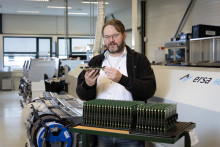Currently, TriboForm is undertaking the ambitious ASPECT project together with twelve European industrial and academic partners. The ASPECT project is funded by the INTERREG North-West Europe Programme, from the European Regional Development Fund.
ASPECT’s target is to increase productivity in stamping processes by a whopping 40% and secondly to reduce maintenance cost of the whole production line by 20-25%. The project aims to achieve this goal by understanding the effect of friction, heat and tribological effects on the failed parts on stamping lines and create counter measures.
The Current Problem of Die Stamping:
After a certain number of parts, the stamping process may start to fail and produce defective parts, with for instance cracks or wrinkles. The main cause lies in the increase in temperature during stamping. The equipment, such as tooling and die holders, commence at room temperature, but due to friction and plastic deformation the temperature rises. Consider how this might influence existing oil between die and metal sheet. The rising temperatures in the tools affect the process by changing e.g. the viscosity of the lubricant. The viscosity changes the friction conditions in the press, which further affects hardening and sheet formability.
What’s ASPECT Doing?
‘Within the project, TriboForm is investigating tribology systems of different zinc coated steel grades, using adapted lubricants and are subsequently identifying the temperature dependent tribology properties’ says Daan Waanders, application engineer at TriboForm Engineering. ‘This includes the temperature dependent properties of the sheet metal, the tooling as well as the lubricant which projects the whole tribology system, showing the reality of how parts behave as a result of different contact pressures, velocities and various lubricant amounts.’
In its second step the project will transfer these effects, as identified by several partners, into finite element codes, producing a model that can predict destructive frictions and temperatures.
The project aims to place this model into the hands of the end user. It will offer enhanced simulations by predicting and mimicking the temperature variations within the stamping machine and it will intelligently reveal how the heat within the machine is rising, varying and declining.
The Future Solution of Die Stamping:
The third phase of the project will allow for engineers to start controlling the whole procedure. Both Phillips and Opel are going to provide demonstration lines in order to test and validate the results of the previous steps. In measuring temperatures during stamping they’ll determine how accurate the element code truly is and if it accurately predicted what transpired in production reality.
Long term the project sees more specialization in the industry, as the gain of knowledge and knowledge transfer will result in highly skilled jobs. Users and engineers will become more skilled in this specific topic and tribology will provide the competitive edge over other production lines once the increase in production speed and turnout success has been realized.









